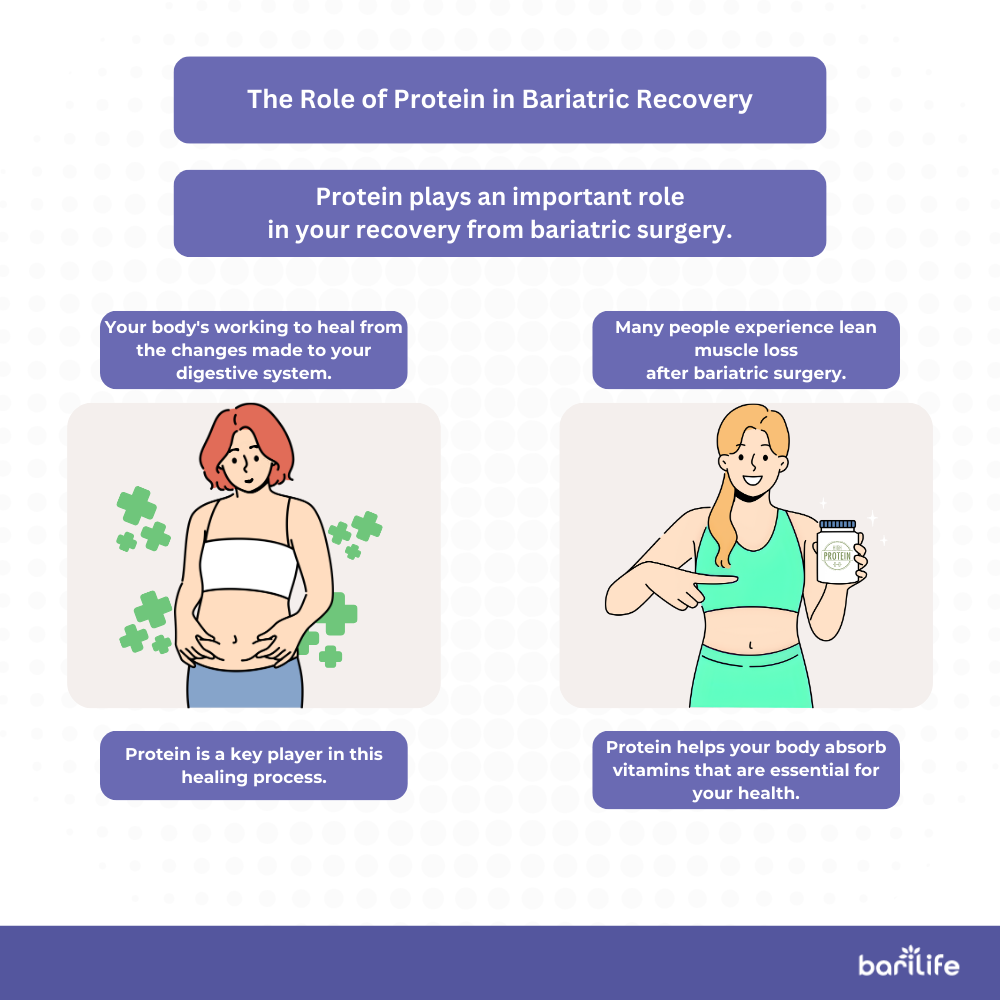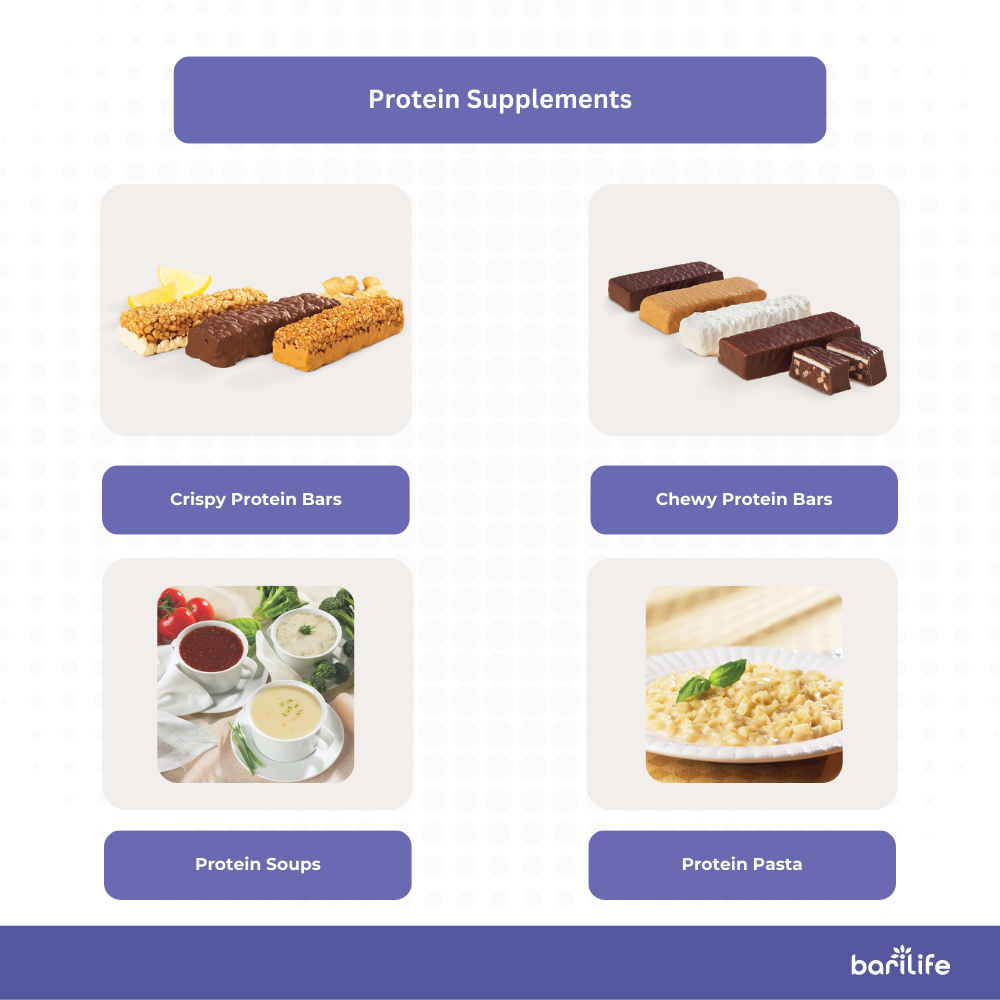Key Takeaways
- Adequate protein intake after bariatric surgery is crucial for your muscle health, healing, and absorbing essential nutrition.
- Incorporating both animal and plant-based proteins along with protein supplements can help you meet your daily protein requirements.
- Not eating enough protein can lead to muscle loss, slower healing, and even hair thinning. But with some planning, you can avoid these effects.
Protein is considered one of the main building blocks in your body. Not eating enough protein can have detrimental effects on your healing process, lean muscles, and long-term weight management goals. After bariatric surgery, it’s critical to understand how much protein after bariatric surgery? is necessary to support your recovery.
However, we know that eating enough protein after bariatric surgery is sometimes difficult with the new changes to your digestive system.
In this article, we’ll discuss the role protein plays in your recovery, present good sources of protein, suggest some protein supplements, discuss what can happen if you don’t eat enough protein, and provide tips to help you meet your daily protein goals.
Table of Contents
The Role of Protein in Bariatric Recovery
Protein plays an immensely important role in your recovery from bariatric surgery.
For one, your body’s working overtime to heal from the changes made to your digestive system. Protein is a key player in this healing process.
Also, many people experience lean muscle loss after bariatric surgery during the phase of rapid weight loss. However, you want to maintain that muscle at all costs, as it plays a role in your metabolism.
Lastly, protein helps your body absorb vitamins and minerals that are essential for your overall health.

Why Protein Intake is Critical Post-Surgery?
Your body needs plenty of protein after surgery for all the hard work it’s doing to get you healed.
Your body has no way of making protein on its own.
If you aren’t eating enough protein and your body decides it needs more protein, it will start taking it from your lean muscles. This is why it’s critical to follow your bariatric team’s guidance on how much protein you need to eat each day.
General recommendation for protein intake after bariatric surgery is usually 60-80 grams per day, However, the ideal amount can vary based on your surgery type, current weight, and gender.
Eating protein also helps you feel full. After surgery, the changes to your digestive system make it so you can only eat small amounts of food at a time. If you are eating foods that digest quickly, you may find yourself frequently getting hungry. Protein, however, helps you feel full for longer.
Also, your immune system is counting on you to eat enough protein so it has the resources it needs to fight off infections and complications after surgery.
Dietary Sources of Protein
When many people think of protein, they think of meat. However, there are plenty of plant sources of protein as well.
One benefit of animal proteins is that they are complete proteins, meaning they contain all nine essential amino acids your body needs for healing and building proteins.
Animal-based lean proteins can include:
- Chicken
- Turkey
- Eggs
- Fish
- Dairy products (whey)
Some plant-based proteins, like soy, pea, and quinoa, are also complete proteins. Other sources of plant proteins are not, and if you prefer these, you’ll need to eat a variety of them to make sure you get all nine essential amino acids.
Plant-based proteins include:
- Soy
- Quinoa
- Pea
- Lentils
- Beans
- Tofu
Eating a variety of proteins throughout the day helps ensure you meet your daily protein needs while also balancing other macronutrients like fats and carbohydrates.

Protein Supplements
Right after bariatric surgery, while you are on a liquid diet, protein supplements are going to be your best friend until you can eat solids again.
Look for protein shakes that contain a high-quality protein source that is low in sugar. You want to avoid dumping syndrome, a common concern after bariatric surgery that causes uncomfortable symptoms if you eat something high in sugar.
Whey protein isolate is a common supplement after bariatric surgery because it’s easy to digest and contains a complete amino acid profile. It’s also lactose-free, which is great if lactose causes stomach problems.
If you prefer a plant-based option, look for a soy protein powder that’s also low in sugar.
Once you can start eating solid foods again, a whole world of protein options opens up. Protein supplements can still be super helpful during this time as your bariatric team may increase how much protein they want you to eat each day.
Having a protein supplement you can toss in the car, your gym bag, or your purse is a great way to help you stay on track.
Barilife has several high-quality protein options designed to meet your nutritional needs after bariatric surgery. Each choice is high in protein and low in sugar and carbohydrates.
- Chewy Protein Bars: Choose from seven flavors of these on-the-go snacks containing 12-15 grams of protein per serving.
- Instant Protein Drink Bottles: Simply add water or milk to these bottles containing pre-measured protein powder, shake, and drink for an instant 15 grams of protein.
- Protein Soups: Mix up a savory soup like chicken bullion, cream of broccoli, or cream of tomato soup for a delicious 15 grams of protein.
- Pudding Shakes: Mix these protein packets with milk or water for a creamy shake or fulfilling pudding of 15 grams of protein.
- Hot Chocolate: Mix up a steaming mug of hot chocolate or another flavor for a delightful treat containing 15 grams of protein.
- Crispy Protein Bars: Stash these crunchy protein bars in your car or gym bag for a quick snack of 15 grams of protein.
- Protein Cereal: Start your morning with 15 grams of protein in a crunchy bowl of cereal mixed with milk or yogurt.
- Protein Oatmeal: Swap out high-carbohydrate oatmeal for this low-carbohydrate and 15 grams of protein oatmeal that’s perfect for a quick breakfast.
- Protein Smoothie Packets: Blend up a refreshing smoothie, such as aloha mango, berry delicious, or strawberry banana, for 15 grams of protein.
- Protein Pancakes: You don’t have to miss out on pancakes with these delicious pancakes containing 15 grams of protein per serving.
- Protein Entrees: These hearty microwaveable meals will satisfy your taste buds and hunger with 13-15 grams of protein per serving.
- Protein Mashed Potatoes: Fulfill your mashed potatoes craving with this perfectly portioned option that provides 11 grams of protein.
- Protein Double Bites: These double bites help fulfill that need for crunchy food while providing 10 grams of protein.
- Protein Pasta: You can still indulge in creamy pasta with these protein pasta meals that contain 15 grams of protein per serving.
- Protein Mug Cakes: Don’t miss out on dessert with these decadent mug cakes that provide 12-15 grams of protein..

Consequences of Inadequate Protein Intake
There are several dangers of not eating enough protein after bariatric surgery. Without enough protein, your body may start to break down your lean muscle tissue. This can lead to feeling weak, not having much energy, and can also slow your metabolism.
Without protein, your body also has a hard time healing properly. Your healing time may be slower, and you are at higher risk of complications such as post-surgery infection.
Another unwanted side effect of poor protein intake is hair loss. Your body starts to prioritize using its limiting protein for healing rather than hair health. You may notice your hair starting to thin at a rapid rate.
Fortunately, by correcting your protein intake and following your bariatric team’s protein intake recommendations, your hair will probably start to grow back.
Tips for Successfully Integrating Protein into Your Diet
Incorporating enough protein into your diet after bariatric surgery can be challenging, but with the right strategies, we know you can do it.
Here are some tips to help:
- Prioritize protein: Prioritize protein-rich foods such as lean meats, eggs, low-fat dairy, and plant-based options like beans and tofu.
- Eat protein throughout the day: It can be helpful to spread protein intake throughout the day by having smaller, protein-focused meals or snacks.
- Incorporate protein powders: Protein shakes or powders can provide a convenient boost, especially in the early stages of recovery when solid foods may be difficult to tolerate.
- Track your protein intake: Tracking your intake using a food journal or an app can help ensure you’re meeting your daily protein goals.
- Plan ahead: By staying mindful and planning ahead, you can successfully maintain the protein intake needed for healing and long-term health.
Conclusion
Making sure you get enough protein after bariatric surgery is essential to your recovery and long-term success.
Protein supports everything from preserving your lean muscles, healing, and nutrient absorption.
Utilizing bariatric vitamins and other supplements like bariatric multivitamins, bariatric multivitamin with iron, or bariatric probiotic can support your body’s needs during this critical time.
Although meeting your daily protein needs can be challenging with your new digestive system, using a variety of protein sources and supplements can make the process easier.
By following your bariatric team’s guidance and incorporating these tips, you can avoid the negative effects of inadequate protein intake and maintain your health and well-being post-surgery.
If you want to learn more, why not check out these articles below:
- Best protein shakes for bariatric patients
- Best protein bars for bariatric patients
- Best protein powder for bariatric patients
- Why do bariatric patients need so much protein?




What are your tips and tricks to post-bariatric success?